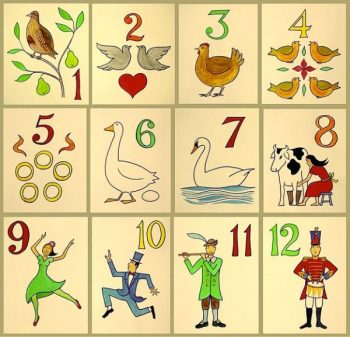Tag Archives: Merry Christmas
How to say “Merry Christmas” and “Happy New Year” in Irish AND Five Examples of Lenition (Séimhiú), to boot Posted by róislín on Dec 24, 2018

(le Róislín) Around this time of year, we often see the phrases “Nollaig Shona” and “Athbhliain faoi shéan agus faoi mhaise duit.” Today’s blogpost will look at how to pronounce these phrases and at the reasons why words like “sona” and “bliain” change to “shona” and “bhliain.” This change of the first letter is called…
More Month-of-May Motifs (i nGaeilge, ar ndóigh) Posted by róislín on Apr 27, 2014
(le Róislín) Is it the “merry month” of May or the “merry, merry month” of May? Is it “meidhreach” or “sona,” “croíúil” or “súgach? Or is it as in the traditional Irish phrase, “buí” (Mí Bhuí na Bealtaine)? We looked at all of those terms in the last blog (nasc thíos) but here’s a quick…
Cé Mhéad Patraisc? Cé Mhéad Drumadóir? (or ’12 Lá na Nollag’ Redux and an Irish Counting Lesson to boot) Posted by róislín on Dec 18, 2013
(le Róislín) In the last blog, we discussed “fearáin” (aka “fearáin bhreaca“) amongst other members of the order Columbiformes (coilm agus colúir, doves and pigeons, etc.). And we briefly alluded to the fact that the Irish for “turtledove” doesn’t have the element “turtle” (turtar) or “dove” (colm, or sometimes “colúir” — for more on the…
Happiness Is … Lots of Ways to Say “Happy” in Irish (including “Happy Christmas”) Posted by róislín on Dec 3, 2011
(le Róislín) Recently we talked about some of the more whimsical (i.e. jingle-ish) ways to describe Christmas (“Holly Jolly” and “Berry Merry”) in English and pondered their translatability into Irish. Today let’s get back to the more traditional Irish phrase, and look at its various forms (singular and plural, greeting and response): Nollaig Shona duit…
“Holly,” “Jolly,” “Merry,” agus “Berry” – An nDéanann Siad Rím le Chéile i nGaeilge? Posted by róislín on Nov 30, 2011
(le Róislín) Well, the answer is no, ní dhéanann siad rím le chéile i nGaeilge. “Athdhúbaltaigh ríme” [pronunciation below] normally don’t when you translate their component parts from language to language. For example, to attempt to translate a popular English rhyming reduplicative, “easy breezy,” in Irish you could choose from the following: easy: éasca, furasta…



